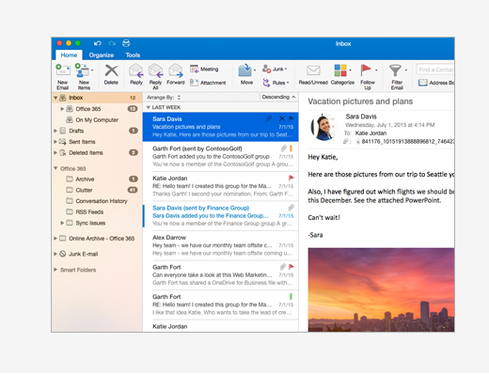Secrets To Digital Success Are Obvious, But Difficult To ExecuteSecrets To Digital Success Are Obvious, But Difficult To Execute
Accenture and Forrester reveal an obvious path to digital success, yet also show how businesses are failing to take care of the basics.


Office 2016: 8 Enterprise-Worthy Features
Office 2016: 8 Enterprise-Worthy Features (Click image for larger view and slideshow.)
Well, how about that. A big consulting firm and market research company have both come to the realization that customer-focused business technology is the only path to an organization's digital transformation. Or, to put it in the language of their recent study, "The customer experience is at the heart of digital transformation." (That may sound awfully familiar to readers of this column.)
In all seriousness, here's what the study was about and what I think it means to enterprise IT. Accenture recently commissioned Forrester to do some research into digital practices, and that is definitely valuable. Like most of this type of research, it was conducted among a reasonable number of decision-makers (396, in this case) on the topic across an international swath of organizations and a similarly broad range of industries: automotive, consumer goods, tech, manufacturing, retail, media, travel, hospitality, energy, finance, banking, and so on. Great stuff.
The research tells us what customer advocates have known for a long time: If you ignore the customer, you can't expect to be successful.
Yet, it's pretty clear that enterprise IT as well as the businesses that we serve need to hear this message. We continue to see how the giants in the digital space delight customers and create authority and loyalty through their apps, campaigns, and websites. Yet, at the same time, we continue to insist that our crappy enterprise apps and old-school marketing are somehow good enough.
But no, actually, they're not.
Customers have a choice. Do you really want your customers to choose someone else? More critically, how do you even know if they are choosing or beginning to choose someone else?
This is not an idle question. According to the study, only 29% of respondents currently see metrics and measurement as critical to their digital success. The problem is trying to run your digital efforts without metrics and measurement is sort of like trying to run an enterprise network without network management, or attempting to run a business without tracking financials. It's totally crazy, and guarantees ignorance about what customers are doing. But according to Accenture's data, that's exactly what businesses are doing.
That is the conundrum of the day. The things that you need to do to be successful at digital business are pretty obvious. So, why don't businesses do the obvious things that they need to do in order to be successful? The trouble is that those things are also pretty hard to do well and consistently, because "something else" always gets in the way.
It's kind of like physical wellness. Everybody knows what to do. It's obvious. Get 30 minutes of exercise every day. Don't smoke. Drink a lot of water. Don't drink too much alcohol. Don't eat things you can't pronounce. Don't overeat. Eat mostly plants. Avoid stress and drama.
[Read How To Get More Resources For IT.]
But how many of us actually have the self-discipline to follow those steps to optimal health? Not too many. Peer pressure from the office crowd leads to eating lunch on a regular basis at the food-crap-o-rama. You're tired after a really stressful day at work, so you don't go to the gym, etc.
The same thing happens with maintaining the basics in digital. That, my friends, is why so few people are successful at digital business and digital transformation. It requires self-discipline. That's what your enterprise needs in order to be successful.
We all know what to do when it comes to digital business. The question is: Will we have the discipline to put the customer first? Can we let go of old, bad habits, where we focus on feature-richness and complexity, instead of a more user-friendly "keep it simple, stupid" design philosophy?
Will we have the discipline and intestinal fortitude to measure our efforts and acknowledge where we are coming up short?
We will have to if we want to succeed with digital business.
About the Author
You May Also Like






